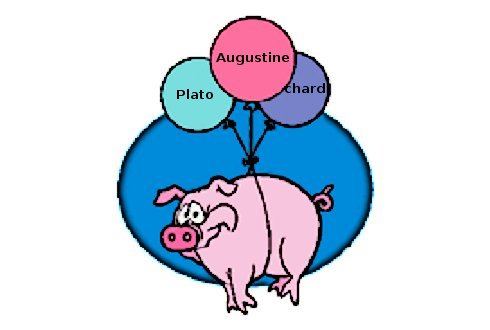Steve Hays fails to rebut the charge of tritheism
A would-be teacher on trinitarian topics is merely an incoherent tritheist.
A would-be teacher on trinitarian topics is merely an incoherent tritheist.
 The “Great Trinity Debate” has been interesting, exhausting, and a bit hard to follow. It would’ve been better to have somewhat shorter posts and required post-rebuttals. As it is, some of the debate has been tucked away in the comments of the posts, while the blog plugs away on other topics. This sort of substantial, quality content shouldn’t be hidden in comments.
The “Great Trinity Debate” has been interesting, exhausting, and a bit hard to follow. It would’ve been better to have somewhat shorter posts and required post-rebuttals. As it is, some of the debate has been tucked away in the comments of the posts, while the blog plugs away on other topics. This sort of substantial, quality content shouldn’t be hidden in comments.
I previously called round 3 a draw. But my call was premature; Burke kept punching, in a long set of comments (#4-15), which substantially strengthened his case. Bowman has left them unanswered for about a week, I believe, as I post this. I re-call this round now for Burke.
Revised score up through round 4:
Bowman: 0
Burke: 3
draw: 1
What he does is address some important texts which as usually read, assert or assume the claims that Jesus created the cosmos, or just that he pre-existed his conception. I can’t summarize Burke’s long exegesis, but I’ll hit a few highlights in this post. What he shows, drawing on some recent scholarship, is that the texts in question can be given non-arbitrary, plausible readings which are consistent with humanitarian christology.
Burke also rebuts some of Bowman’s points re: prayer to Jesus. Bowman argues that Christ can’t be a creature, and must be omniscient (hence divine), if he can hear and answer prayers. This argument is hardly a knockdown one.
Read More »SCORING THE BURKE – BOWMAN DEBATE – ROUND 3 Re-evaluated (DALE)
 In this post I venture to offer some debate advice: be very hesitant to accuse your opponent of a logical fallacy.
In this post I venture to offer some debate advice: be very hesitant to accuse your opponent of a logical fallacy.
In round 4, Burke makes the 3rd error, Bowman the 4th.
Burke argues,
Even Acts 5, where the apostle Peter accuses Ananias of “lying to the Holy Spirit” (verse 3) and his wife of trying to “test the Spirit of the Lord” (verse 9) is not an open and shut case. The usual argument made from this passage is that Peter accuses Ananias of “lying to the Holy Spirit” and Sapphira of trying to “tempt the Holy Spirit”; but since an impersonal power cannot be lied to or tempted, the Holy Spirit must therefore be a person and therefore it follows that the Holy Spirit is God. The logic here is not terribly good, and the argument ends with a non sequitur.
Neither this nor what follows it make clear what Bowman’s errors in reasoning are supposed to be. What exactly is the argument he’s criticizing? Is it this?Read More »SCORING THE BURKE – BOWMAN DEBATE – Round 4 Part 1

MMM indeed! Henry of Ghent doesn’t spare the medieval lingo, and as Scott points out, it seems he never met a trinitarian theory he didn’t like – emanation, psychology, relations – it’s all good! Thanks to its being Thanksgiving break – and let me say Happy Thanksgiving to all our American and Canadian readers – I’ve caught up on the recent posts, as well as some very involved comments on my original H.O.G. post. (To those just jumping in – we’re using some letters defined in this post – it actually helps!) Here are some comments and questions relating to the lengthy comments on my original H.O.G. post. Perhaps this’ll give Scott some grist for the mill as he continues his series on Henry’s trinitarian theory. Read More »H.O.G. Questions
How does one objectively evaluate a definition of a concept, e.g. trinitarian or unitarian?
One thing that makes disputes about the Trinity intractable is the fact that different Christians have different views about just where authoritative Christian tradition is to be found.
Continuing our yarn from last time, imagine that our guru Opi changes his strategy. Now he instead tells his disciples that “Opi is the dopi” means that Opi is eternally the uniquely smartest teacher, and also that eternally, there is a teacher smarter than Opi. Here, he teaches them to believe an apparent contradiction, that eternally, Opi is and is not the smartest teacher. But is… Read More »10 steps towards getting less confused about the Trinity – #3 Take the mystery out of appeals to “mystery” – Part 3
What would we expect to find in the New Testament writings if the authors thought Jesus was a man, a god, or a godman?
 Over at Parchment and Pen Michael Patton has posted a chapter on the Trinty, part of a forthcoming book called The Discipleship Book, intended to instruct new Christians.
Over at Parchment and Pen Michael Patton has posted a chapter on the Trinty, part of a forthcoming book called The Discipleship Book, intended to instruct new Christians.
Dear new Christians – beware. Patton is sincere, but misinformed. He thinks the Bible obviously teaches what he’s asserting, and reasons that any prior Bible-loving Christians must’ve thought likewise.
But having studied a vast amount of historical writings by Christians, I can assure you that this is demonstrably not so, even if we stick to “mainstream” Christians (so ignoring, e.g. “Arians”, Marcionites, etc.) I take no pleasure in pointing this out, and I wish it were as simple as Patton says. But facts are facts.
I’ve discussed his sort of take on the Trinty before. It is not, as Patton says in a comment, “what the Bible teaches and Christians for 2000 years have believed.” It is what (some? many?) theologians at Dallas Theological Seminary think about the Trinity. How widespread these views are, I’m not sure. But the many evangelical and other theologians riding the “social trinitarian” bandwagon would not agree with what Patton says.
Regarding what Patton holds forth as “the best we can do”, take care lest you fall into inconsistency.
You should know that some of the most brilliant Christian thinkers in the last 100 years have held many different views on just how “the” doctrine should be understood. Unfortunately, these theories are, for the most part, not consistent with one another.
Patton asserts thatRead More »Warning to New Christians
Richard Swinburne is one of the greatest living Christian philosophers, who has made immense contributions to philosophy of religion and philosophical theology. It is only idolatry of the past that prevents people from seeing him as great a Christian intellectual as Origen, Augustine, Aquinas, or Leibniz. In my view, he’s plainly a better, clearer, more well-rounded philosopher than any of them. “A prophet is honored… Read More »Is God a Self? – Part 7 – Swinburne

More philosophical theology in a small town newspaper. This is a response to Steve’s column, but I’m really just trying to communicate with the broader public about the interest of Trinity theories. It is cross-posted at the Objectivist v. Constructivist v. Theist blog. – Dale
Thinking About the Trinity
12 26 08 (Published in The Observer 1 14 09)
Perhaps, dear reader, you’re a Christian considering New Years resolutions. Let me suggest a resolution to reflect more on theology to which you are committed. Trinity theories (they are many) are attempts to reconcile an apparently inconsistent set of four claims many readers find in the Bible: There is only one God, the one Jesus calls Father is God, Jesus is God, and Jesus is not his Father. From any three of these, it seems to logically follow that the fourth is false. (Go ahead – try out all the combinations.)
There is an official answer to this difficulty, Read More »Thinking about the Trinity
A leading Christian philosopher explains his “Social” Trinity theory.
Is saying that the NT “includes Jesus in the divine identity” clearer than saying in the NT “Jesus is God”?
After what has been said in the foregoing pages, we are prepared to re-assert, in conclusion, that the modern doctrine of the Trinity is not found in any document or relic belonging to the church of the first three centuries. Letters, art, usage, theology, worship, creed, hymn, chant, doxology, ascription, commemorative rite, and festive observances, so far as any remains, or any record of them… Read More »the concept of a triune God an anachronism in the first three centuries
We had our first post here or 6 / 19 / 06 – over 350 posts ago! Thus, we are 5. Ready for Kindergarden, evidently! 😉 Many thanks to J.T. Paasch, Scott Williams, and Joseph Jedwab for their excellent posts! And thanks to the many great commenters here; we’ve had some vigorous discussions, and only very rarely have things gotten a bit too “hot.” You folks are awesome. A… Read More »trinities turns 5
Want to debate (or just refute) me? Here are some things you should study.
Is “the doctrine of the Trinity” essential to salvation? To Christianity?
Do Genesis 48, 1 Samuel 3, and Jeremiah 1 refute biblical unitarian views on God and Jesus?
In the reign of Constantius II yet another council offered language to replace Nicea…